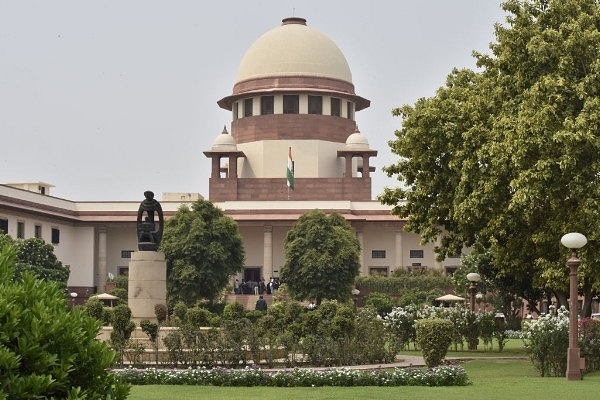Politics
SC’s Order On Judicial Audit Of All Temples, Mosques, And Churches Is Foolhardy
- To order district judges to go from temple to church to mosque to inspect what each one of them is doing right or wrong is simply wrong-headed.

A Supreme Court order has asked for a judicial audit of all religious places and charitable institutions on their standards of hygiene, entry regulations, assets, and accounts. (Sonu Mehta/Hindustan Times via Getty Images)
Sometimes one wonders if Supreme Court judges have thought through the implications of their orders. Last month, a two-judge bench comprising Justice Adarsh Kumar Goel (now retired and head of the National Green Tribunal) and Justice S Abdul Nazeer, signed an order with mind-boggling repercussions. It has judicial overreach written all over it.
The order asked for a judicial audit of all religious places and charitable institutions on their standards of hygiene, entry regulations, assets, and accounts. This means millions of temples, gurudwaras, mosques, and churches, among other institutions, will face direct judicial scrutiny at the district level.
The only merit in the order is its non-discriminatory nature in that it targets all religious institutions – and not just Hindu ones, as has been the case largely so far. But the sheer scope of the order’s ambit means that ultimately it will either be unimplementable or implemented only with non-protesting Hindu institutions. Which mosque or church will offer unrestricted access to district judges to forage through its books and practices without shouting “discrimination”.
Most district judges and state officials, in fact, live in fear of the mosque and the church as they do not want to be accused of implementing a majoritarian agenda. Since most Hindu institutions have anyway been excluded (in practice) from the minority protections of Articles 25-30, the chances are, the audits will take place largely in Hindu shrines. And in places where temples and Hindu charitable endowments are controlled by the state (in the southern states), the order will be just ignored. District officials, who are beholden to state governments, will not challenge temple managements under state control.
The Supreme Court bench, says a Times of India report, has given itself jurisdiction in religious affairs with the following observation: “Difficulties faced by visitors, deficiencies in management, maintenance of hygiene, appropriate utilisation of offerings and protection of assets with regard to shrines, irrespective of religion, is a matter for consideration not only for the state government and the central government, but also courts.”
This is a bizarre claim when the basic definition of “secularism” ought to be a separation of temple and state. Even state and central governments ought not to intervene, except when things go wrong and there may be a need for the temporary supersession of shrine management to set things right.
In this context, to order district judges to go from temple to church to mosque to inspect what each one of them is doing right or wrong is simply wrong-headed. The Times of India report which unveiled this judicial order notes that there may be over 20 lakh active major temples, three lakh active mosques, and thousands of churches, not to speak of much smaller temples which function (or lie dysfunctional) on their own.
This is not to say that religious shrines, including many Hindu ones, are run well, or even run hygienically or competently. The recent cases of the theft of idols from Tamil Nadu temples and jewels from the Tirumala Tirupati Devasthanams (TTD) indicate that even large temples allow the assets of devotees to be lost through carelessness or official connivance.
But given the scale of the audit being ordered, which anyway is a case of unnecessary overreach, the remedy may be worse than the disease.
The bench’s order may seem to be technically neutral between religions, but it has mistaken the symptoms for the disease. The real disease is state control and mismanagement of temples – and temples alone. Temples need freedom, and not more judicial scrutiny, whether it is the Sri Padmanabhaswamy temple in Kerala or some other shrine. Temples should ideally be run by public trusts or non-profit companies whose managers are accountable to the devotees, with the state stepping in only when things go wrong.
The Supreme Court bench has set the court off in the wrong direction. If more judicial intervention in religious issues is going to be the norm, one shudders to think how they will decide the Sabarimala case, or the Puri Jagannath temple case. The shrine audit order was precipitated by a public interest litigation involving the Jagannath temple. The court has already observed that it wants the temple to admit non-Hindus. Scrutiny of one temple’s practices has now been expanded to the whole universe of shrines.
Foolhardy, to say the least.
Support Swarajya's 50 Ground Reports Project & Sponsor A Story
Every general election Swarajya does a 50 ground reports project.
Aimed only at serious readers and those who appreciate the nuances of political undercurrents, the project provides a sense of India's electoral landscape. As you know, these reports are produced after considerable investment of travel, time and effort on the ground.
This time too we've kicked off the project in style and have covered over 30 constituencies already. If you're someone who appreciates such work and have enjoyed our coverage please consider sponsoring a ground report for just Rs 2999 to Rs 19,999 - it goes a long way in helping us produce more quality reportage.
You can also back this project by becoming a subscriber for as little as Rs 999 - so do click on this links and choose a plan that suits you and back us.
Click below to contribute.
Latest